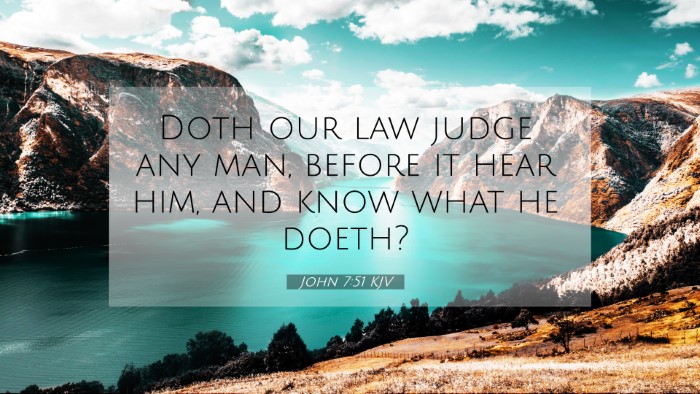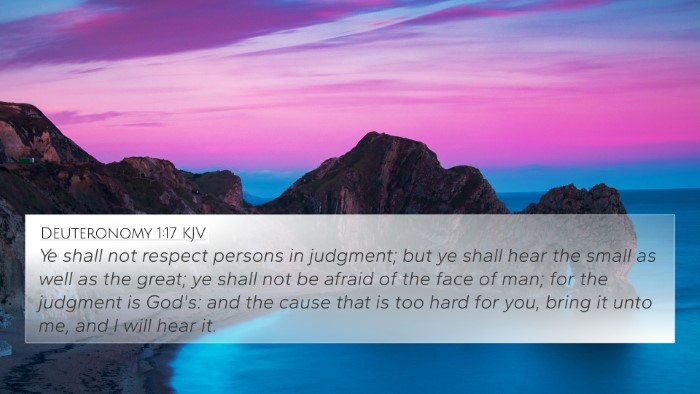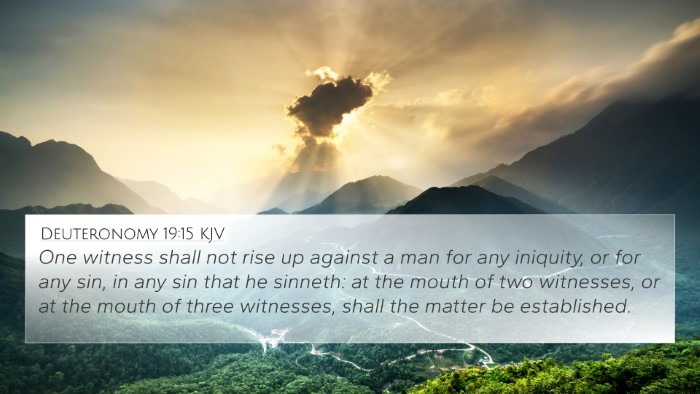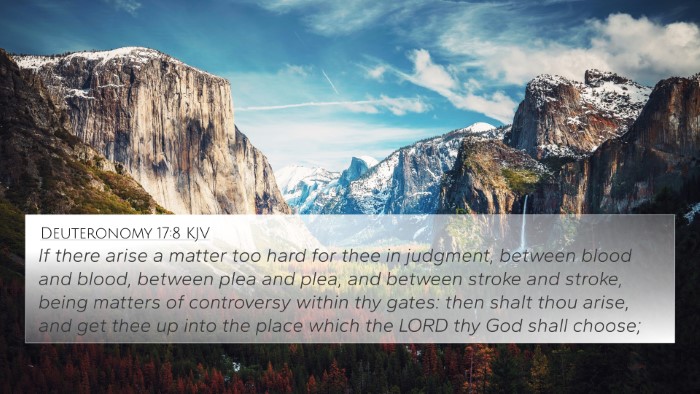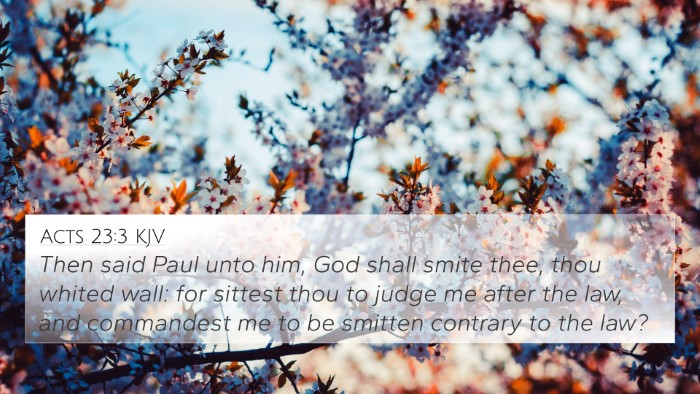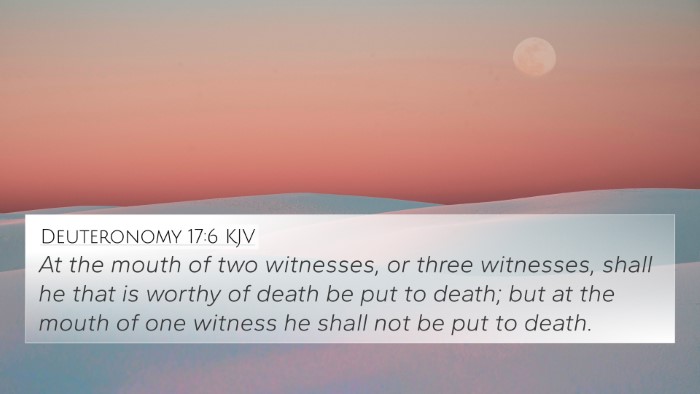Understanding John 7:51
In John 7:51, we see an intriguing situation unfold where Nicodemus, a member of the Sanhedrin, stands up to defend Jesus amidst the controversy surrounding Him. This verse reads: "Doth our law judge any man, before it hear him, and know what he doeth?"
Meaning and Interpretation
This verse engages in a deeper examination of legal principles as understood in Jewish law. It underscores the importance of due process, emphasizing that no judgment should be rendered without first hearing and understanding the matter at hand. This reflects a broader principle of justice found throughout the Scriptures.
Insights from Public Domain Commentaries
Matthew Henry Commentary
Matthew Henry emphasizes the significance of Nicodemus's intervention. He points out that Nicodemus seeks to remind the authorities of their own legal protocols. It showcases Nicodemus's personal growth and boldness in challenging the status quo. Henry elaborates on the concept of justice, asserting that a fair trial is fundamental in God’s eyes and by Jewish law.
Albert Barnes' Notes
Albert Barnes provides insight that Nicodemus raises a valid point regarding the lawfulness of condemning Jesus without a proper hearing. He brings forward the idea that this action exemplifies the hypocrisy of the Pharisees, who claim to uphold the law but disregard its tenets in their plight against Jesus. This appeal also foreshadows the eventual fate of Jesus, culminating in a miscarriage of justice.
Adam Clarke's Commentary
Adam Clarke adds that Nicodemus not only stands for the legal principles but also subtly advocates for mercy and careful consideration of Jesus's actions. Clarke argues that this moment is pivotal, as it reveals Nicodemus’s internal conflict and the challenges faced by those grappling with faith in the midst of societal pressure.
Bible Verse Cross-References
John 7:51 is interwoven with many other verses that explore themes of justice, law, and the nature of judgment. Below are some critical cross-references:
- Deuteronomy 1:16-17 - This passage conveys the importance of fair judgment among the people, highlighting that justice applies to all, regardless of status.
- John 8:15-16 - Jesus speaks of judging according to the flesh versus divine judgment, tying back to the concepts of understanding and hearing before acting.
- Exodus 23:1-2 - God's instructions in the law reinforce the principle that witnesses should not bear false witness, once again affirming the necessity of due process.
- Matthew 7:1-2 - This exhortation against hasty judgment serves as a reminder for believers to carefully consider their own actions before condemning others.
- Proverbs 18:17 - This proverb notes that the first to plead their case seems just until another comes and examines them, resonating with Nicodemus's plea.
- John 3:17 - Here, the purpose of Jesus’s coming is clarified—not to condemn but to save, presenting an important contextual understanding of judgment.
- Acts 25:16 - This passage discusses the Roman system of law and the rights afforded to individuals, reinforcing the theme of just trial before condemnation.
- Micah 6:8 - This scriptural affirmation of doing justice, loving mercy, and walking humbly is vital to God's demand for behavior aligned with His nature.
- James 2:13 - This verse warns that judgment without mercy will be shown to anyone who has not been merciful, linking back to Nicodemus’s plea for fairness.
- Romans 14:10-12 - Paul addresses the responsibility each one has to God, reinforcing the idea that we will all stand before His judgment.
Connecting Themes Across the Bible
The theme of judicial fairness and the proper treatment of individuals resonates throughout both the Old and New Testament. John 7:51 serves as an example of how individuals are often caught in the conflict between societal norms and personal convictions. Each cross-reference reveals another layer of moral and ethical considerations that highlight God’s design for justice in human interactions.
Cross-Referencing Biblical Texts for Deeper Study
To enhance understanding and contextual analysis of John 7:51, utilizing tools for Bible cross-referencing is highly effective. Here are key methods and resources for deeper research:
- Bible Concordances: Helps locate verses by keywords to uncover connections.
- Bible Cross-Reference Guides: These provide thematic and topical links between scriptures.
- Cross-Reference Bible Study: Engaging in studies focused on how different scriptures relate can brighten understanding.
- Comprehensive Bible Cross-Reference Materials: Resources compiling extensive verse connections are invaluable for researchers.
- Bible Chain References: These illustrate trajectories of thought across scripture, revealing inter-Biblical dialogue.
- Identifying Connections Between Old and New Testament: This broadens understanding of scripture unity and narrative.
- Comparative Study of Pauline Epistles: To identify legal principles emphasized in Paul’s teachings in relation to the law and grace.
- Cross-Referencing Psalms with New Testament Teachings: Explore parallels in authorship and themes such as justice and mercy.
Conclusion
John 7:51 illustrates the necessity of justice and the appropriate means to reaching a conclusion, both in legal and spiritual disciplines. By studying this verse with the identified cross-references, we embrace a fuller understanding of Biblical principles—showing the importance of careful discernment in judgment.


